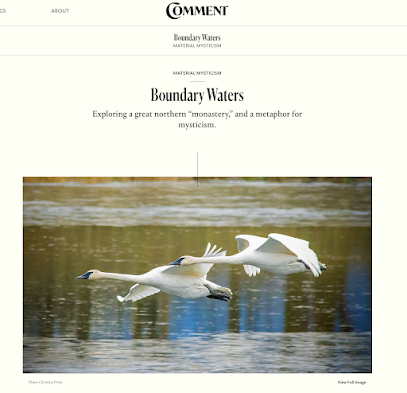Refuted at last, over at the Substack.
millinerd.com
since 2003
Sunday, December 28, 2025
Tuesday, December 16, 2025
Reefer Madness
Being the title to my end of year Substack which I think wraps things up quite well, and introduces the last Material Mysticism of 2025, On Christ and Coral. And here is the video for Miracles on Roosevelt Road.
Friday, November 28, 2025
Love Letter to Canada
I was humbled (but not humbled enough to not let you know) by the chance to give the Larkin-Stuart lecture at the University of Toronto’s Trinity College last week. Inspired by John Ruskin (and guided by my geologist colleague Stephen Moshier) I tried to fuse art history and geology as Ruskin did (the Royal Ontario Museum is a few Carboniferous stone throws away). Here is one of my claims within the address to perhaps spur you (or enrage you enough) to watch: If we wish to celebrate the Indigenous wisdom of North America as Christians, we should be slow to discard the equally Indigenous Mediterranean wisdom of Plato as well, who was so much less “dualistic” than he is made out to be. But if you’ve read your Dionysius the Areopagite, you knew that.
Tuesday, November 18, 2025
Evangelicalism: A Love Story
Here is this month's Material Mysticism. I have learned that length on the internet is the surest protection from dismissive abuse and willful misunderstanding. Antagonists tend to give up after 800 words.
Tuesday, November 04, 2025
Tuesday, October 21, 2025
A Hell of Mercy
The October Material Mysticism is Salvation by Dread Alone, a descent into the maw of despair, with a teaser at Substack entitled The Contemplative Consummation of Atheism.
Sunday, September 28, 2025
Tuesday, September 23, 2025
Decoy Enlightenment
Being the September issue of Material Mysticism, and interview with the ever insightful Ashley Lande, with an introductory post at substack. Here, by the way, is a response to a question about Buddhism at Radiopaper.
Tuesday, August 19, 2025
Julian for Everyone
Here is the August Material Mysticism, and here is some more background: Was Lady Julian Eastern Orthodox? The saints are always ahead.
Friday, August 15, 2025
Welcome to Chartres: Liberal Arts in the Age of AI
Reports of the death of the liberal arts have been greatly exaggerated. Here is our orientation video for Wheaton this year. Let’s go!
Tuesday, July 15, 2025
Tuesday, June 17, 2025
Calling all Merton Haters
Maybe you think nobody reads him. Maybe you claim to be "bored" with him. Maybe you've been deceived by less than careful biographies that claim he graduated from traditional morality or became Buddhist. But one of the reasons you might be bored with him is due to less than entirely helpful takes. He's no mascot for milquetoast Christianity, even if that's how he's been (quite literally) sold.
Ask yourself if these sentiments from his late journals don't register today:
I cannot help feeling a sense of decay in everything – I mean in the society I belong to and even in the Church, in the monastery. A much deeper and more serious sense, because there seems to be so little substance in the noisy agitation of progressives who claim to be renewing the Church and who are either riding some rather silly band-wagon or caught up in factional rivalries. As for the conservatives – they are utterly depressing in their tenacious clinging to meaningless symbols of dead power, their baroque inertia, their legalism. Disgust!
Now I'm just a suburban Anglican art historian. I'm not one of them there fancy Merton scholars. But I'm more than three decades into reading him now, and I'm telling you: I CAN WIN YOU BACK (in my June Material Mysticism column at Comment).
Monday, June 16, 2025
Tuesday, June 10, 2025
puffins and then some
We know you have a choice about articles that parallel Evelyn Underhill with ornithology and we're glad you chose this one (the latest Material Mysticism that you can subscribe to for free here).
Also, with
a Chicago pope (second city no more!), it’s a good time to catch up on
your theology of the Midwest. The introduction to The Everlasting People was kindly published by Church Life Journal. All proceeds from this book go to support the Wade Center and you can purchase it here. More extended details on some upcoming writing and speaking can be found over at the ol' substack.
Monday, May 12, 2025
Bright Darkness & Guadalupe
Some follow up thoughts on that subject over at Radiopaper thanks to some kind questions. "Christian darkness is a darkness shot through with Eucharistic light." Then some more on Guadalupe: "If Guadalupe is really about evangelization, we can’t leave out the need to evangelize historians." And theodicy, and the refreshing of an older post.









